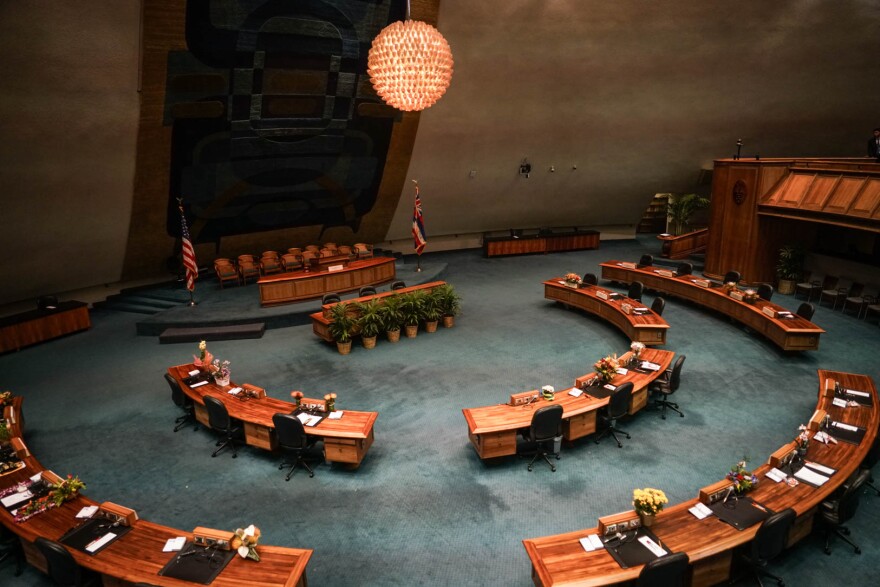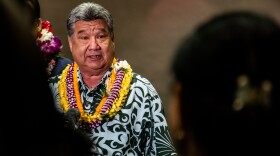On one of the last days of the legislative session, state lawmakers narrowly voted to stall a measure that sought to ban assault rifles.
Wednesday’s vote on Senate Bill 401 was abnormal for a measure that has come so far in the legislative process. But ultimately, the bill won’t become law this year.
“We're asking for a tragedy by not doing that. This law nearly got us there, and at the last minute, in the 11th hour, we had some legislators who turned their back on their constituents,” said Chris Marvin from Everytown for Gun Safety.
He was advocating for the bill, which would have banned the sale and possession of semi-automatic assault rifles beginning in 2026.
The bill included a provision for those who already own assault rifles to retain ownership of them and pass them down to family members as an heirloom.
But before SB401 could have a final vote, Sen. Lynn DeCoite proposed a floor amendment that included the ability to use assault rifles on private property; compensation for those who have to surrender legally owned guns; and exemptions for licensed firearms dealers, subsistence hunters and conservation workers.
She and other senators said, in part, that they were worried the bill would impact those who hunt invasive axis deer and wild pigs.

The amendment also allowed magazines that accept more than 10 rounds to be passed down, whereas the bill would have banned that.
“Let us support responsible ownership. Let us support effective conservation. Let us stop the financial bleeding caused by invasive species, and let us ensure our laws are not enforced at the expense of those who protect the land,” DeCoite said.
Those in support of the amendment included DeCoite and Sen. Tim Richards, who are both farmers, and the three Senate Republicans.
Other Democrats had concerns with SB401 more generally.
Sen. Joy San Buenaventura praised the state’s strict gun laws but said, “I have voted in favor of all of those strict gun laws, but now, at a time when we are going to actually criminalize legal hunters, we’ve gone too far.”
Senate Judiciary Chair Karl Rhoads, who introduced the measure, pushed back and urged his colleagues not to pass the floor amendment.
“If we pass it, it basically eviscerates the underlying bill,” he said. “The whole point of the bill is that when police are trying to take down a mass murder shooter, the opportunity they have to do that is primarily when they're reloading. And if you have a 100-round canister, you don't have to reload very often. So the whole point of the bill is to make that more difficult.”
Rhoads also confirmed to the chamber that the House of Representatives, which was simultaneously holding its final floor votes, was not offering a vote on the version of SB401 with the same amendments.
What happened on the Senate floor?
At this stage of the session, a bill will effectively die if the House and Senate don’t pass the same bill, meaning a vote in favor of DeCoite’s amendment was a vote to block the bill.
By the slimmest margin, the Senate voted 13-12 to pass the amendment. Both chambers then decided to recommit the bill to committee, effectively shelving it until next year.
There were two unlikely, ultimately pivotal votes in favor of the amendment: Senate President Ron Kouchi and Sen. Glenn Wakai.

Wakai, along with Rhoads, was one of three senators who introduced SB401. The other was Sen. Stanley Chang.
Wakai declined Hawaiʻi Public Radio’s request to comment on his vote.
It’s also unusual for the Senate president to break with the subject matter committee chair — Rhoads, in this case. But in a media availability session after the floor votes, Kouchi initially told HPR that he did not vote in favor of the floor amendment.
“Thirteen were in favor. I was one of the 12 that voted against,” Kouchi said. “Although I usually don't lose, I did lose on that one.”
The Senate floor vote for the amendment was a flurry of confusion. Senators actually voted twice on DeCoite’s amendment.
In the first vote — which was by hand — Kouchi announced that it had failed. However, that call was questioned during a recess a few minutes later, so Kouchi called for a second vote — this time a roll call — and the amendment passed.
HPR asked Kouchi to clarify his vote, and he said he misspoke when he said he voted against the amendment.
When asked why he broke with Rhoads to shelve the bill, Kouchi said, “The concern was turning the law-abiding citizens into felons. And we had hoped that we'd be able to work on some of the amendments, and at this point … I supported what they put forward.”
He also worried the bill would impact the ability to control axis deer and feral pigs.
What next?
Everytown for Gun Safety’s Chris Marvin, a veteran, pushed back against the argument that banning assault rifles would make it difficult to hunt invasive species.
“I served in the military. I took an M-4 to Afghanistan, and I know that that gun was made to take human life,” he said.
“These guns are meant to kill humans, and there's this fallacy that hunters and ranchers need these guns to shoot feral pigs. The truth is the bill allowed for a lot of versions of semi-automatic rifles to shoot feral pigs. They just took away the features that make it easier to kill people.”
He added that assault rifles are often the weapons of choice for mass shootings.
According to Everytown for Gun Safety’s survey of about 700 Hawaiʻi voters, 75% did not think people should be allowed to own or purchase semi-automatic rifles like AR-15s.
SB401 will roll over to the next legislative session.
Sen. Tim Richards, who voted for the amendment, told reporters he would work with Public Safety Committee Chair Brandon Elefante, who voted against the amendment in support of the bill, on the measure next year.
“I committed to Sen. Elefante on the floor right after, I said, ‘Look, I'm gonna work on this bill with you for next year to make sure that this thing can go through,’” Richards said. “We support it. It's those nuances that we have to tweak a little bit.”
This year's regular legislative session ends Friday, May 2.
Hawaiʻi Public Radio exists to serve all of Hawai‘i, and it's the people of Hawai‘i who keep us independent and strong. Help keep us strong to serve you in the future. Donate today.








